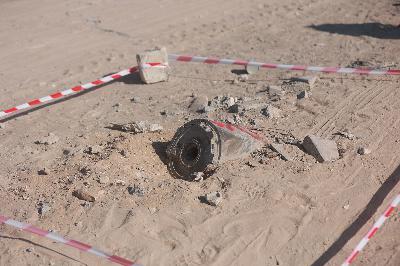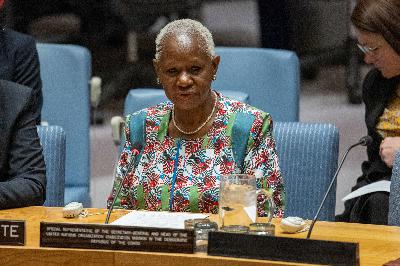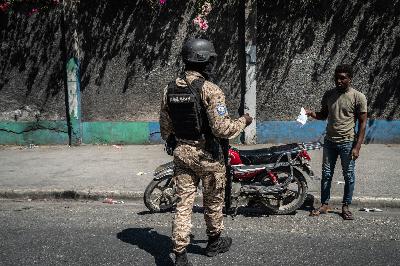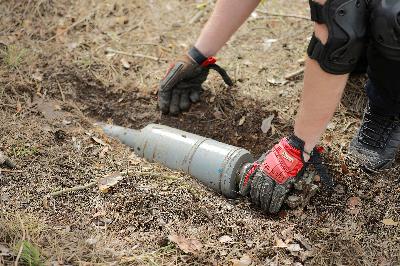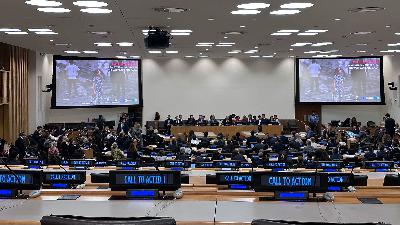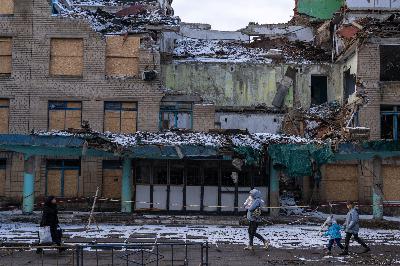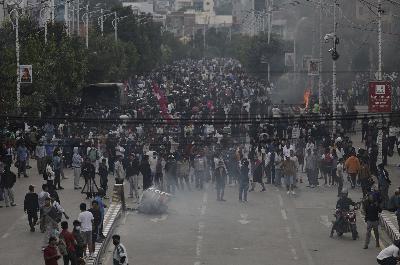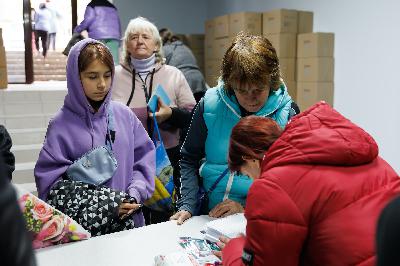Discover UN Interviews
UN Interviews

UN Interviews
Author: United Nations
Subscribed: 60Played: 1,436Subscribe
Share
Description
UN News interviews a wide range of people from senior news-making officials at Headquarters in New York, to advocates and beneficiaries from across the world who have a stake in helping the UN go about its often life-saving work in the field.
312 Episodes
Reverse
As access slowly improves under the Gaza ceasefire deal, the UN Mine Action Service (UNMAS) is scaling up operations and mobilising funds to ensure the safe removal of dangerous munitions following two years of devastating bombardment.Priority is being given to main roads, infrastructure, and essential services for civilians in the enclave who face a deadly threat from unexploded hazards.Luke Irving, head of UNMAS’s mission in the Occupied Palestinian Territory, spoke to UN News’s Ezzat El-Ferri, emphasising a message of hope and resilience for civilians through “small steps” each day.
Women are central to achieving food security in Tanzania as they make up 70 per cent of the East African nation’s agricultural workforce; that’s according to the Food and Agriculture Organization (FAO) Representative in the country, Nyabenyi Tipo.FAO is celebrating its 80th anniversary on World Food Day on 16 October, the theme for which is collaborating for a peaceful, sustainable, prosperous, and food-secure future.Sabrina Said asked Ms. Tipo about the significance of this milestone and how FAO Tanzania is celebrating the occasion.
The head of the UN peacekeeping mission in the Democratic Republic of the Congo, MONUSCO, is urging people in the restive eastern part of the country not to lose hope after years of conflict.Binto Keita spoke to UN News’s Jérôme Bernard a few days after she briefed the Security Council in New York on the overall situation in the DRC.She emphasized that the government, the UN and the international community remain engaged in efforts to bring peace to the east, where armed groups continue to terrorise communities.Ms. Keita expressed compassion and empathy for the Congolese people whose “resilience is also very much admirable.”
A larger and more robust force in Haiti could help “turn the tide” against murderous gangs and give Haitians hope for the future, according to the UN’s designated expert on the human rights situation in the Caribbean country, William O’Neill.Up to 90 per cent of the Haitian capital Port-au-Prince is controlled by numerous gangs who murder with impunity and take hostages for ransom.A UN-backed Multinational Security Support Mission (MSS) has been unable to stem the violence, but it is hoped the transition to a new, larger and better equipped Gang Suppression Force could prove decisive.UN News’s Daniel Dickinson asked Mr. O’Neill how important it is to establish the new force.
At just 15 years old, Zunaira Qayyum has already emerged as a climate champion and a UN Children’s Fund (UNICEF) Youth Advocate for Climate Action and Girls’ Empowerment in Pakistan.In 2022, she began researching how floods and heatwaves in her hometown of Hub, Balochistan, were forcing girls out of school. Her work earned her recognition as one of the winners of UNICEF’s Policy Research Challenge the following year.Today, children across Pakistan face mounting threats from floods, heatwaves, and other extreme weather events, which are making access to education increasingly difficult.UN News’s Hareem Ahmed spoke with Zunaira about her advocacy for gender and climate justice, as well as her views on the importance of youth inclusion in climate action.
As war in Ukraine intensifies, five European countries – Estonia, Lithuania, Latvia, Finland and Poland – withdrew this year from the Ottawa Convention banning landmines and the Convention on Cluster Munitions – a move that is deeply concerning Tamar Gabelnick.As Director of both the International Campaign to Ban Landmines (ICBL) and the Cluster Munition Coalition, she was in New York urging action to defend the conventions last week as world leaders addressed the General Assembly.In an interview with UN News’s Cristina Silveiro she said considering Russia’s continuing invasion of Ukraine it made sense for nearby nations to focus on self defence – but anti-personnel landmines “remain the dumbest weapon in the world” and “it’s pure chance who they will strike.”
Since the UN was created eight decades ago in the wake of a catastrophic World War, real progress has been made on freedom, equality and justice.But that's not much comfort to those living in conflict zones today worldwide, where accountability is scarce and impunity is rife.UN News’s Conor Lennon caught up with the UN’s High Commissioner for Human Rights Volker Türk on Wednesday who’s in New York for high-level week and began by asking him what can really be done to rein in the abusers, beyond naming and shaming them.
In the margins of the General Assembly’s high-level week, UN agencies and partners have come together to highlight the plight of Palestinian children in the West Bank and Gaza.According to the UN Children’s Fund (UNICEF), over 19,000 youngsters have been killed in Gaza over the past two years – an average of 28 children killed every day – the equivalent of an entire classroom. Another 42,000 children have been injured. Speaking to UN News’s Khaled Mohamed UNICEF Deputy Executive Director Ted Chaiban emphasized that the international call to action aims to uphold child rights and help them envision a viable future.
Five years away from the 2030 deadline, none of the global gender equality targets are on track. From poverty to conflict, the setbacks are staggering.According to a new UN report launched on Monday, extreme poverty rates for women and girls have hardly moved in the last five years.Data shows that by the year 2030, there will be 351 million women and girls who live in the very worst forms of poverty around the world.But the report also points to real solutions, and what’s possible when countries invest in women and girls.UN News’s Ana Carmo sat down with Sarah Hendriks, Director of the Policy Division at UN Women, to discuss the main findings of the 2025 SDG Gender Snapshot report.
With just five years left to achieve the Sustainable Development Goals (SDGs), not a single gender equality target is on trackThe finding comes in the Gender Snapshot 2025 report issued on Monday by UN Women and the UN Department of Economic and Social Affairs (DESA).Prior to the launch, UN News’s Anshu Sharma spoke to Christine Arab, UN Women’s Regional Director for Asia and the Pacific.She discusses the report and how women’s groups there are ensuring their voices are heard, including in promoting climate resilience.
Around the world, education is under attack, impacting millions of children. In Ukraine alone, more than 1,800 schools have been damaged or destroyed since 2022, according to the UN Children’s Fund (UNICEF), depriving countless children of their right to safe learning.But the crisis goes beyond damaged buildings. Nelson Rodrigues, Education Specialist for UNICEF Ukraine, told UN News that children’s well-being has been severely damaged by constant air raid alerts, living underground in shelters – and the psychological toll of uncertainty.He told UN News's Nargiz Shekinskaya the disruption is not only about shattered classrooms – it’s also about the daily resilience children must show just to keep learning under fire.
Following the Nepalese government’s ban on social media platforms due to non-registration and concerns about misinformation, large youth-led protests erupted across the capital Kathmandu and other cities on Monday.The demonstrations are escalating rapidly, with at least 15 people killed and more than 100 injured amid clashes, curfews, and reports of police using tear gas and possibly live ammunition.UN Resident Coordinator in Nepal, Hanaa Singer-Hamdy, described the events as “unlike Nepal,” expressing deep concern for civilian safety and stressing the urgent need to ensure unrestricted medical access for the injured.UN News’s Anshu Sharma began by asking her to describe the situation on the ground.
Nearly four years into Russia’s full-scale invasion of Ukraine, and 11 years since conflict began, the toll on people’s mental health is severe.Women and girls are disproportionately affected, facing displacement, economic uncertainty, heightened risks of gender-based violence, and the constant pressure of protecting their families during repeated attacks.Speaking from the capital Kyiv, which suffered deadly strikes last week, and following a visit to the frontline region of Sumy, UN Women’s Representative in Ukraine Sabine Freizer Gunes described both the emotional exhaustion and resilience of women.She told UN News’s Nathalie Minard that empowering women and restoring a sense of normalcy are crucial steps to help relieve the stress of war.
The numbers of dead and wounded following the deadly earthquake in remote eastern Afghanistan – as well as the needs of survivors – are going to climb in the days ahead, the UN warned on Tuesday.The head of the UN aid coordination office (OCHA) in Afghanistan, Amy Martin, told UN News’s Sachin Gaur that at least 20 emergency rapid assessment teams have been deployed, amid major access challenges, a disastrous drought – and shrinking aid budgets.
The head of the UN agency for Palestine refugees (UNRWA), Philippe Lazzarini, has renewed his urgent call for a ceasefire in Gaza, warning that civilians face death not only from bombardment but also from mass starvation and lack of aid.Despite severe restrictions on humanitarian access, UNRWA continues to provide medical care, clean water, and shelter to hundreds of thousands. But Israel continues to severely impede food distribution – despite international food experts’ assessment that famine will spread.“Every hour today counts, the more we wait, the more people will die,” the UNRWA Commissioner-General said in an interview with UN News’s Daniel Johnson.
The UN Interim Force in Lebanon, UNIFIL, has operated since the late 1970s, tasked with monitoring the demilitarisation of the south of the country, supporting the Lebanese army, and ensuring that humanitarian aid reaches civilians in need.Every year, the mandate has to be renewed by the Security Council, but powerful voices have been raised against extending it, which could spell either its closure, or lead to budget cuts that reduce its ability to operate effectively.With the Security Council deadline just a few days away, Nancy Sarkis from UN News spoke to Andrea Tenenti, UNIFIL’s long-time spokesperson, and began by asking him to explain why it’s still needed.
An education specialist who left Somalia as a child when the civil war broke out in 1991 has now returned to support the Ministry of Education as they expand national testing. The programme which enabled this specialist, named Shire Salad, to return — Migration for Development in Africa or MIDA — is run by the International Organization for Migration (IOM) and recruits diaspora experts who have a “personal desire to give back."MIDA then pairs these experts with local professionals who work together to advance the development of hospitals, schools and other institutions. While the diaspora experts ultimately leave, the hope is that their skills will remain. UN News’ Naima Sawaya spoke with Mr. Salad about his experience returning to Somalia after so many years.
People in Haiti are living through “hell on earth,” according to William O’Neill, the UN’s designated expert on human rights in Haiti. Armed gangs – predominantly in the capital Port-au-Prince – are parasitically extracting financial resources from the population and perpetrating horrific acts of violence, he says – but they’re just one cog in a larger cycle of impunity, corruption and violence.Following the release of the most recent report on human rights in Haiti, UN News’ Naima Sawaya spoke to Mr. O’Neill about whether a path forward to peace even exists. She began by asking if he had ever met a gang leader.
In Gaza, women and girls have been bearing the brunt of the catastrophic humanitarian situation for the past 22 months. In addition to the constant threat of sexual violence, pregnant and breastfeeding mothers in the enclave face a daily struggle to get the help they need. Despite the continuing devastation – as Israel moves to assert more military control over the enclave – the UN Population Fund (UNFPA) and partners are mobilised and working around the clock to provide life-saving services on the ground, as UN News’s Nathalie Minard has been hearing from Laila Baker, Regional Director for Arab States for UNFPA.
In Sudan, as violent conflict between forces of the Sudanese military and their rival Rapid Support Forces militia rages for its third year, women are facing the brunt of the humanitarian crisis.Female-led households struggle to access food, girls and women face high risks of exploitation and abuse when trying to access humanitarian aid, and all the while, A accessible women-run organizations are vastly under-resourced.Salvator Nkurunziza, the UN Women representative in Sudan, sat down with UN News’s Abdelmonem Makki to discuss the struggles women face in Sudan and the solutions that should be implemented.


